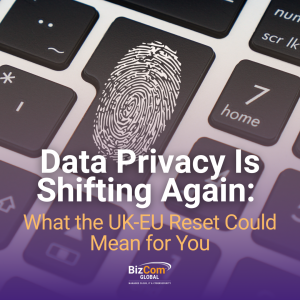
Cross-border operations may soon face new data handling requirements. Business leaders need to prepare now to avoid disruption later — even if you’re not based in the UK.
In a world where business moves faster than regulation, keeping up with evolving data privacy standards can feel like a game of international whack-a-mole. But the latest developments in UK-EU relations signal a critical shift that business leaders can’t afford to ignore.
Even if you don’t operate directly in the UK or EU, the ripple effects may still impact your contracts, cloud services, compliance, or cyber insurance requirements — especially if your clients, vendors, or platforms are subject to new data rules.
The Big Picture: UK-EU Negotiations Are Shifting the Landscape
The UK and European Union have been renegotiating elements of their post-Brexit relationship — and data privacy is squarely on the table.
At the core of the issue is how personal and business data can be transferred across borders, how it must be stored, and what rights users have. While the EU has the well-known General Data Protection Regulation (GDPR), the UK’s independent approach is beginning to diverge, with changes that could affect everything from vendor contracts to cloud hosting.
Why This Matters to U.S. and Global Businesses
Here’s where the real-world implications come in — even for companies not directly subject to EU or UK laws:
You may be using software or cloud providers hosted in the UK or EU — their obligations change, and so might yours.
You may work with clients or vendors who operate internationally — and they may need you to update your contracts or security practices.
- Your cyber insurance provider may audit your data handling policies to ensure they align with new cross-border requirements.
This isn’t just a compliance checkbox — it’s a business continuity issue. The last thing any company wants is a contract delay, data transfer interruption, or insurance denial due to out-of-date policies.
What Business Leaders Should Do Now
You don’t need to be a legal expert or a data security engineer to manage this risk effectively. Here’s how to lead proactively:
Review your third-party vendors and platforms.
Understand where your data is stored and whether it’s flowing through regions affected by shifting UK/EU regulations.Revisit your data privacy and cybersecurity policies.
Ensure they align with current expectations for encryption, consent, access, and breach response — especially if you handle sensitive client information.Talk to your IT provider about compliance readiness.
Make sure they’re watching international changes and can advise on platform-level or system-level adjustments that may be needed.- Verify your cyber insurance requirements.
Many policies now include very specific language around compliance with international privacy laws — even if you don’t sell internationally.
Adaptability Is the New Competitive Edge
Data privacy isn’t a one-and-done effort. It’s a moving target. Business leaders who stay alert and agile — even in the face of complex, international policy changes — will find themselves better protected, more resilient, and easier to do business with.
You don’t have to react in panic. You just need a plan.
Need help understanding how these shifts affect your business?
Reach out to BizCom Global for a compliance check-in or Gap Analysis. We’ll help you turn complexity into clarity — and risk into readiness.



